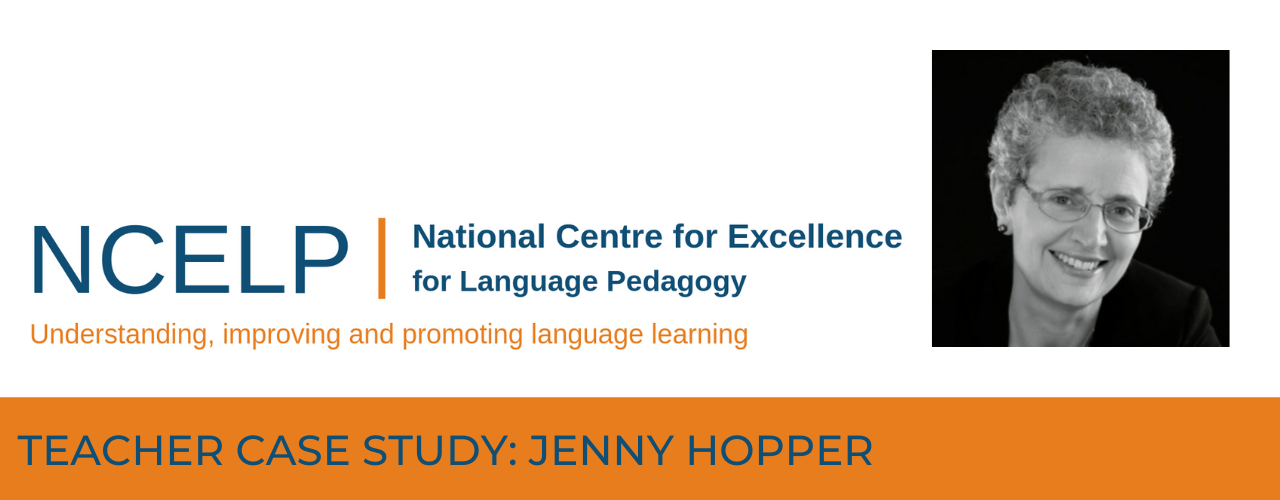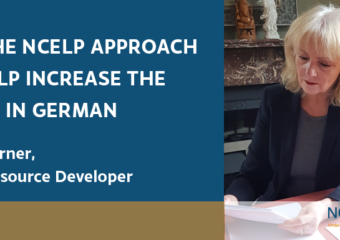We interviewed Jenny Hopper, NCELP Course Leader, and Head of MFL at Sir William Borlase’s Grammar School.
How long have you been working with the NCELP SoW?
French and German SoW since September 2019, Spanish SoW since Sept 2020
Which features of the NCELP SoW do you particularly enjoy/appreciate with the NCELP SoW?
I enjoy the creativity with phonics throughout and in particular the way it is constantly revisited as new vocabulary and grammar are introduced. Because there is such regular progress and practice on phonics, the students are not just more able, but also much more keen to read aloud and to try new words without fear or hesitation.
The clarity and consistency of the grammar explanations are great, and the fact that the grammar is regularly revisited and consolidated means that the students are more actively remembering and practising the new grammar, and reusing it in different contexts. Year 7 grammar resources are also available as mini lessons on the portal, and these slides are great revision resources – not just for Year 7!
The clarity and the consistency of the grammar explanations are great
What is the impact on your students?
When we first started the SoW, we were concerned whether the vocabulary, determined by frequency, and the apparent lack of topics, would be a hindrance. 2 years on, we think that, notwithstanding COVID interruptions, the vocabulary knowledge is at least as good as, if not better than, previous cohorts. In particular, the students have a much broader range of verbs at their disposal and a deeper knowledge of vocabulary overall, in that they can recognise and reuse words now in different contexts far more readily than in previous textbook schemes of work. The frequent revisiting has helped this.
The students have a much broader range of verbs at their disposal and a deeper knowledge of vocabulary overall
Have you had to overcome any challenges and, if so, how have you done this? What is the impact on your students?
The biggest challenges have been COVID-related, and we did what we could to overcome these with online teaching. Slides are available in Google, not just PowerPoint, so we were able to use selections of these for self study. The Language Guides are also adaptable, so that individual pages could be posted as study guides to support exercises. Tasks could be adapted from speaking to writing when required, and the availability of all the lessons on Oak National Academy meant that students could be directed to these lessons if a teacher wasn’t available. We have a few cases where students were not able to attend lessons for extended periods for health and wellbeing reasons. The Oak National Academy lessons have been invaluable here, as they are motivational, and the student herself feels as though she is doing her best to keep up with her peers in school.
There are often occasions where students want further practice or consolidation, or want to take a point further. We’ve adapted the slides with additional practice exercises. And we set the pace to suit our context. That means that we sometimes have to move on a couple of lessons or go back and repeat/extend a lesson if particular points aren’t clear. That’s not an issue, as the grammar and vocabulary are revisited regularly, and the resources can easily be adapted.
Vocabulary homework practice tasks are really rich, particularly from Year 8 onwards, with synonyms, antonyms, collocations etc.
Have you innovated to suit your context?
Language Guides: We give each student a copy of the relevant year’s Language Guide as a study resource, to be brought regularly with their exercise book to lessons. (Online versions of the previous year’s Language Guide are also on Google Classroom for revision and signposting)
Homework: Vocabulary homework practice tasks are really rich, particularly from Year 8 onwards, with synonyms, antonyms, collocations etc. But it’s not always easy to get the students to do the homework. We’re using the extended homework sheets as quick-fire pair practice in class for vocabulary consolidation, sentence-building and phonics practice. And we’re varying the homework tasks to include supported reading, listening or writing.
Assessment: This year, we’re breaking the assessment tasks down to smaller and more frequent tests. Instead of only 2 rounds of assessments, with Achievement Tests in Term 2 and both Achievement and Applying Your Knowledge in Term 3, we’re going to do elements of both ahead of data drop points each term. And we are aiming to have some very low stakes Applying Your Knowledge exercises within lessons to help build on speaking, comprehension and writing tasks.
Differentiation: The grammar explanations are great, but sometimes become overcrowded. We’ve amended, by spreading the information across several slides and building up the practice more slowly. For some pupils, we’ve given adapted slides with additional prompts, fewer gaps. There are some great ideas and differentiation options on the slides already, but we’ve sometimes taken these even further to break down tasks. Speaking tasks can sometimes take a long time to set up because of the importance of making sure both parties are actively engaged – e.g speaking/listening or speaking/writing. We have had to adapt/simplify these to be able to fit them into lesson time, but the students really enjoy the double responsibility and the genuine information gap, so it’s important to set them up well, even if that means we don’t are can’t do every single speaking exercise to its full extent.




